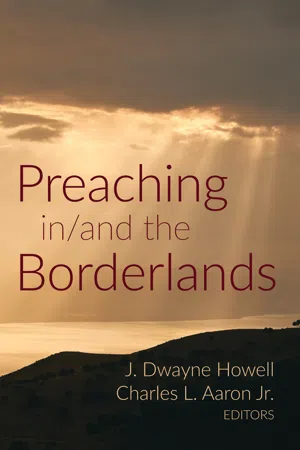
Preaching in/and the Borderlands
- 188 pages
- English
- ePUB (mobile friendly)
- Available on iOS & Android
Preaching in/and the Borderlands
About this book
What is to be the church's response to the immigrant? Most immigrants in American society are seeking a better life. They are among the most vulnerable, possessing little and at the mercy of those they work for in the communities where they live. The essays in this book address issues for churches to consider as they seek to better understand how to respond to immigration. The book examines biblical, ethical, theological, and homiletical areas of the topic and includes contributions from experienced pastors, theologians, legal experts, and activists.With contributions from:Sarah Ellen Eads AdkinsClaudio CarvalhaesJason W. CrosbyMiguel A. De La TorreRebecca HensleyRobert HochMelanie A. HowardMaha KolkoGerald C. LiuJoy MooreHeidi NeumarkOwen K. RossLis ValleMichael Waters
Tools to learn more effectively

Saving Books

Keyword Search

Annotating Text

Listen to it instead
Information
This Is Just the End
Table of contents
- Title Page
- Preface
- Contributors
- Poem: They Cross the Border
- Chapter 1: This Is Just the End
- Chapter 2: Why I’m Here
- Chapter 3: “Being White These Days”29
- Chapter 4: Making U.S. Protestant Disciples of All Nations
- Chapter 5: An Overview of the Current Landscape of Immigration Law
- Chapter 6: Immigration and the Biblical Migrant Narratives
- Chapter 7: Turning Cheeks at Checkpoints
- Chapter 8: Moving from Caution to Faithful Proclamation
- Chapter 9: Toward a Border-Crossing Homiletic
- Chapter 10: Comrades of the Kin-dom212
- Chapter 11: God’s Kingdom at the Border
- Chapter 12: Wounded Enough for Someone to Believe
- Chapter 13: Immigrant Ministry through Relationships
- Chapter 14: By God’s Grace
- Bibliography
Frequently asked questions
- Essential is ideal for learners and professionals who enjoy exploring a wide range of subjects. Access the Essential Library with 800,000+ trusted titles and best-sellers across business, personal growth, and the humanities. Includes unlimited reading time and Standard Read Aloud voice.
- Complete: Perfect for advanced learners and researchers needing full, unrestricted access. Unlock 1.4M+ books across hundreds of subjects, including academic and specialized titles. The Complete Plan also includes advanced features like Premium Read Aloud and Research Assistant.
Please note we cannot support devices running on iOS 13 and Android 7 or earlier. Learn more about using the app